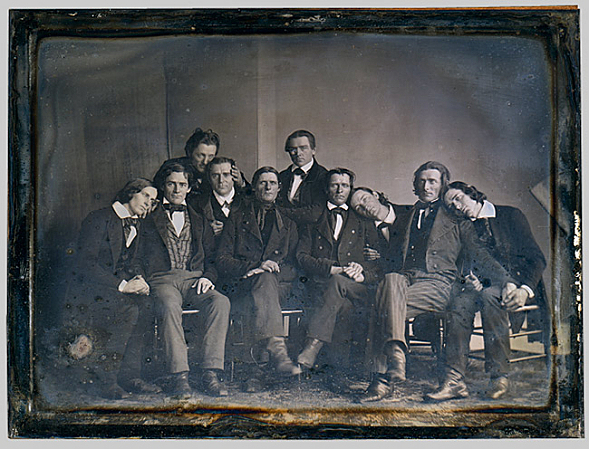We mean to make things over,
We are tired of toil for naught
With but bare enough to live upon
And ne'er an hour for thought.
We want to feel the sunshine
And we want to smell the flow'rs
We are sure that God has willed it
And we mean to have eight hours;
We're summoning our forces
From the shipyard, shop and mill
Eight hours for work, eight hours for rest
Eight hours for what we will;
Eight hours for work, eight hours for rest
Eight hours for what we will.
The beasts that graze the hillside,
And the birds that wander free,
In the life that God has meted,
Have a better life than we.
Oh, hands and hearts are weary,
And homes are heavy with dole;
If our life's to be filled with drudg'ry,
What need of a human soul.
Shout, shout the lusty rally,
From shipyard, shop, and mill.
Eight hours for work, eight hours for rest
Eight hours for what we will;
Eight hours for work, eight hours for rest
Eight hours for what we will.
The voice of God within us
Is calling us to stand
Erect as is becoming
To the work of His right hand.
Should he, to whom the Maker
His glorious image gave,
The meanest of His creatures crouch,
A bread-and-butter slave?
Let the shout ring down the valleys
And echo from every hill.
Ye deem they're feeble voices
That are raised in labor's cause,
But bethink ye of the torrent,
And the wild tornado's laws.
We say not toil's uprising
In terror's shape will come,
Yet the world were wise to listen
To the monetary hum.
Soon, soon the deep toned rally
Shall all the nations thrill.
Eight hours for work, eight hours for rest
Eight hours for what we will;
Eight hours for work, eight hours for rest
Eight hours for what we will.
From factories and workshops
In long and weary lines,
From all the sweltering forges,
And from out the sunless mines,
Wherever toil is wasting
The force of life to live
There the bent and battered armies
Come to claim what God doth give
And the blazon on the banner
Doth with hope the nation fill:
Eight hours for work, eight hours for rest
Eight hours for what we will;
Eight hours for work, eight hours for rest
Eight hours for what we will.
Hurrah, hurrah for labor,
For it shall arise in might
It has filled the world with plenty,
It shall fill the world with light
Hurrah, hurrah for labor,
It is mustering all its powers
And shall march along to victory
With the banner of Eight Hours.
Shout, shout the echoing rally
Till all the welkin thrill.
Eight hours for work, eight hours for rest
Eight hours for what we will;
Eight hours for work, eight hours for rest
Eight hours for what we will.
We are tired of toil for naught
With but bare enough to live upon
And ne'er an hour for thought.
We want to feel the sunshine
And we want to smell the flow'rs
We are sure that God has willed it
And we mean to have eight hours;
We're summoning our forces
From the shipyard, shop and mill
Eight hours for work, eight hours for rest
Eight hours for what we will;
Eight hours for work, eight hours for rest
Eight hours for what we will.
The beasts that graze the hillside,
And the birds that wander free,
In the life that God has meted,
Have a better life than we.
Oh, hands and hearts are weary,
And homes are heavy with dole;
If our life's to be filled with drudg'ry,
What need of a human soul.
Shout, shout the lusty rally,
From shipyard, shop, and mill.
Eight hours for work, eight hours for rest
Eight hours for what we will;
Eight hours for work, eight hours for rest
Eight hours for what we will.
The voice of God within us
Is calling us to stand
Erect as is becoming
To the work of His right hand.
Should he, to whom the Maker
His glorious image gave,
The meanest of His creatures crouch,
A bread-and-butter slave?
Let the shout ring down the valleys
And echo from every hill.
Ye deem they're feeble voices
That are raised in labor's cause,
But bethink ye of the torrent,
And the wild tornado's laws.
We say not toil's uprising
In terror's shape will come,
Yet the world were wise to listen
To the monetary hum.
Soon, soon the deep toned rally
Shall all the nations thrill.
Eight hours for work, eight hours for rest
Eight hours for what we will;
Eight hours for work, eight hours for rest
Eight hours for what we will.
From factories and workshops
In long and weary lines,
From all the sweltering forges,
And from out the sunless mines,
Wherever toil is wasting
The force of life to live
There the bent and battered armies
Come to claim what God doth give
And the blazon on the banner
Doth with hope the nation fill:
Eight hours for work, eight hours for rest
Eight hours for what we will;
Eight hours for work, eight hours for rest
Eight hours for what we will.
Hurrah, hurrah for labor,
For it shall arise in might
It has filled the world with plenty,
It shall fill the world with light
Hurrah, hurrah for labor,
It is mustering all its powers
And shall march along to victory
With the banner of Eight Hours.
Shout, shout the echoing rally
Till all the welkin thrill.
Eight hours for work, eight hours for rest
Eight hours for what we will;
Eight hours for work, eight hours for rest
Eight hours for what we will.
Contributed by Bernart Bartleby - 2014/3/10 - 10:33
Sembrerebbe che la canzone sia di qualche anno precedente e da attribuirsi a The Hutchinson Family Singers…
[1848]
Parole di Jesse Hutchinson Jr.
Musica dello stesso Jesse Hutchinson Jr. o di un altro “J. J.” della grande famiglia di cantanti (Judson o John)
[1848]
Parole di Jesse Hutchinson Jr.
Musica dello stesso Jesse Hutchinson Jr. o di un altro “J. J.” della grande famiglia di cantanti (Judson o John)
Bernart Bartleby - 2015/9/2 - 13:48
Rettifico il precedente commento.
Autore del testo fu effettivamente Isaac G. Blanchard, editore in Boston, e della musica il rev. Jesse Henry Jones (1836-1904), compositore e militante nel movimento per l'ottenimento della giornata lavorativa di 8 ore.
Il 1866 è la data di pubblicazione ma la canzone fu scritta diversi anni prima, così come precedente è l'interpretazione degli Hutchinson Family Singers, che la cantavano proprio ai meeting del movimento.
Autore del testo fu effettivamente Isaac G. Blanchard, editore in Boston, e della musica il rev. Jesse Henry Jones (1836-1904), compositore e militante nel movimento per l'ottenimento della giornata lavorativa di 8 ore.
Il 1866 è la data di pubblicazione ma la canzone fu scritta diversi anni prima, così come precedente è l'interpretazione degli Hutchinson Family Singers, che la cantavano proprio ai meeting del movimento.
B.B. - 2015/9/2 - 14:38
×
![]()
Note for non-Italian users: Sorry, though the interface of this website is translated into English, most commentaries and biographies are in Italian and/or in other languages like French, German, Spanish, Russian etc.









Versi di I.G. Blanchard, pubblicati sul “Workingman's Advocate” nel 1866
Musica di Jesse H. Jones, pubblicata sul “Labor Standard” nel 1878
Testo e nota introduttiva trovati su Contemplator
Ho attribuito la canzone non al suo autore, sul cui conto non avevo notizie precise, ma ai Cincinnati’s University Singers che nel 1978 realizzarono un disco, intitolato “The Hand That Holds The Bread - Progress and Protest in the Gilded Age - Songs from the Civil War to the Columbian Exposition”, dove è presente anche questa “Eight Hours”.
In 1850 the average work week was 70 hours, in 1900 the average work week was 60 hours and in 1920 the average work week was 50 hours. In the 1840s unions began working for a 10 hour day.
Agitation for the eight hour day began after the Civil War. Congress passed an eight hour law on June 25, 1868, but it was largely ignored. In the 1880s the issue was revived. This song was written during that revival and became the official song of the movement. The tune is by Rev. Jesse H. Jones and the words are by I.G. Blanchard.
During the year 1886 there were demonstrations and strikes throughout the country, culminating in a demonstration on May Day (May 1) 1886. In Chicago police killed six striking workers. The next day, at a demonstration in Haymarket Square to protest the killings, a bomb exploded in the middle of a crowd of police, killing eight of them. The police arrested eight anarchists in the unions, four of whom were hanged. However, there is still speculation that the police planted the bomb.
Despite union efforts, the eight hour day was not established in the United Sates until 1938 with the passage of the Wage and Hour Law.
A Chicago, gli operai della McCormick Harvesting Machine Company si scontrarono con i crumiri (“strikebreakers”), la polizia e gli agenti privati della famigerata agenzia Pinkerton… Il 3 maggio furono due, o forse sei, i manifestanti che rimasero uccisi sotto i colpi sparati da poliziotti e vigilantes.
Il giorno successivo fu convocato un grande meeting di protesta ad Haymarket Square.
Quando la polizia intervenne in forze per disperderlo, una bomba rudimentale fu lanciata contro gli agenti, uccidendone uno e ferendone mortalmente altri sei. A quel punto si scatenò il caos: i poliziotti, presi dal panico, cominciarono a sparare all’impazzata, uccidendo quattro presenti e ferendosi anche tra di loro. Fu una vera e propria carneficina, della quale – senza che mai sia stato individuato l’attentatore - furono incolpati gli anarchici: August Spies, Samuel Fielden, Adolph Fischer, Albert Parsons, Michael Schwab, Louis Lingg e George Engel (tutti dirigenti o militanti anarchici o radicali, quasi tutti immigrati di origine tedesca) vennero arrestati e condannati a morte.
Uno si suicidò in carcere, ad un altro la pena fu commutata in ergastolo; Engel, Fischer, Parsons e Spies salirono sulla forca cantando la Marsigliese…
Solo nel 1938 le otto ore divennero una realtà…